Operational Models
The CALP Network’s State of the World’s Cash Report identifies different types of operational model, including consortia and alliances, shared cash delivery mechanisms, single agency cash delivery, and integration of systems.
“The overall structure through which agencies work jointly…to deliver cash and voucher programming…in situation response and analysis, program design and implementation.”
Our working definition of an operational model.
Scaling up CVA offers opportunities to transform how humanitarian aid is delivered. It has implications for the roles of different agencies within various operational models, and the potential for models to link to social protection systems. It will also impact the nature of partnerships with financial service and technology providers, and how different models interact with other forms of assistance, beyond cash.
Current priorities
Since late 2016, the CALP Network has been coordinating a learning agenda to help answer these questions:
- What operational models are available to agencies implementing CVA?
- How do different models improve the efficiency, effectiveness and accountability of CVA in different contexts?
- Which operational models are most appropriate in which contexts?
We will continue to collate and disseminate the evidence base for operational models.
We are also a partner in the Cash Monitoring, Evaluation, Accountability, and Learning Organizational Network (CAMEALEON) consortium, led by Norwegian Refugee Council, which is responsible for independent monitoring and evaluation of WFP’s Multi-Purpose Cash Assistance (MPCA) in Lebanon. This includes research and analysis regarding value for money and accountability in the operational model.
Featured content

Operational Models: Accountability to affected people
Webinar

MEAL in Emerging Operational Models
Webinar

CTP Operational Models Analytical Framework
Guidelines and Tools
The State of the World’s Cash Report launched by the CALP Network in February 2018 highlights trends in the uptake of various operational models for the delivery of cash at scale in humanitarian response. Current decision making on the choice between these various operational models is highly influenced by context, and by the policies and approaches of donor agencies. Decision making on...
Thematic lead
Latest
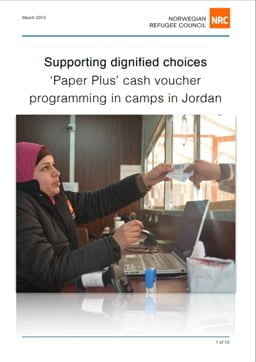
Supporting Dignified Choices ‘Paper Plus’ Cash Voucher Programming in Camps in Jordan
Report
The Norwegian Refugee Council (NRC) in Jordan has directly assisted close to 400,000 vulnerable Syrian refugees in both formal camps and host communities since it began operations in November 2012. NRC is the lead partner of UNHCR in Zaatari and Azraq camps in providing refugees with shelter and the...
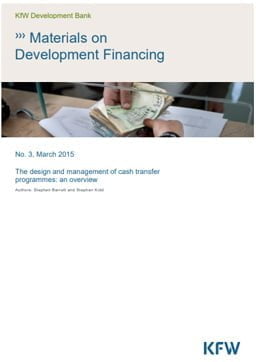
The Design and Management of Cash Transfer Programmes: An Overview
Policy paper
This paper describes and explains the operations of cash transfer schemes, outlining good practice in the design processes required to operationalize policy-level design principles. It describes the four key components comprising the administrative structure of most cash transfer programmes and, based on...
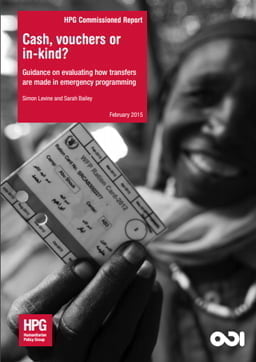
Cash, Vouchers or In-Kind? Guidance on Evaluating How Transfers are Made in Emergency Programming
Guidelines and Tools
In humanitarian settings, aid agencies often assist populations by transferring resources, usually using cash, vouchers or in-kind aid, such as food rations, shelter materials, seeds and tools and kits of household items. The use of cash or vouchers to replace in-kind aid is most pronounced in food...

Philippines Haiyan Response – A multi-sectoral review of the use of market analysis and the design and implementation of CTPs
Report
Following Typhoon Haiyan, which hit the Philippines on November 8 2014, at least 45 aid agencies chose to implement Cash Transfer Programming (CTP) to assist the more than 16 million people affected. Cash transfers were a logical approach in a country with developed market systems, strong financial...

Electronic Cash Grants in Emergencies: Approaches and lessons learned
Report
Cash distributions in an emergency: A concept that seems so obvious today yet has only recently gained recognition within humanitarian response programming for its speed, efficiency and—above all—effectiveness.
This document provides a snapshot for humanitarian response peers on best practices,...

Cash Transfer Program in Northern Syria
Report
Humanitarian needs, both in Syria and neighbouring countries (Lebanon, Jordan, Turkey and Iraq), have rapidly increased since the beginning of the conflict. The Aleppo governorate, as one of the county’s most populated areas with a total population of 4,670,000, has suffered from the consequences...
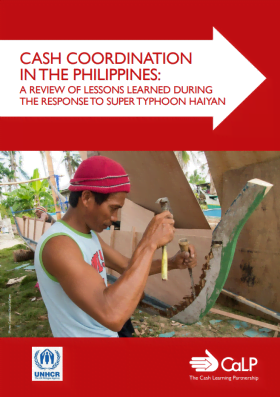
Cash Coordination in the Philippines: A review of lessons learned during the response to Super Typhoon Haiyan
Report
In the last five years there has been a growing trend towards the use of cash transfer programming (CTP) as a response modality in emergencies across the humanitarian sector. The fungibility of cash, when provided without restrictions, offers increased choice for affected populations to...

Cash Transfer Programming: Feasibility and appropriateness in the context of IOCC´s humanitarian response to refugee and migrants´ crisis in Greece [Kos and Chios Island]
Report
This paper aims at assessing the feasibility and appropriateness of cash transfers programming (CTP) within the operational areas of International Orthodox Christian Charities (IOCC) and their humanitarian response activities to the refugees and migrants´crisis on the Greek Islands Chios and...
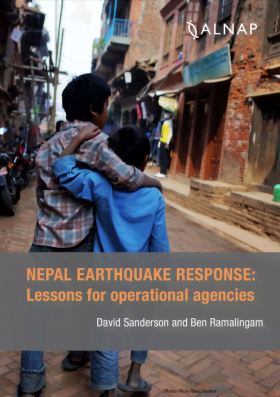
Nepal Earthquake Response: Lessons for operational agencies
Policy paper
In the aftermath of the April 2015 earthquake in Nepal, this paper looks at lessons drawn from previous comparable disasters and seeks to provide invaluable information and assistance to the operational agencies responding to the crisis. Seventeen Lessons give an overview of important learnings based on...

The Road to Recovery Cash Transfers as an Emergency Response to Nepal’s Earthquake of 2015 and a Catalyst for Consolidating Nepal’s Social Protection Floor
Report
On 27 May, the Nepal Ministry of Finance issued a decision: “Approval of top up cash transfer for early recovery for vulnerable population affected by the Earthquake”. This marks the beginning of a crucial intervention. Proposed interventions: This paper outlines a proposal to address the economic...
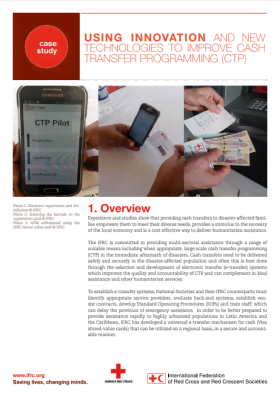
Using Innovation And New Technologies to Improve Cash Transfer Programming (CTP)
Report
Experience and studies show that providing cash transfers to disaster-affected families empowers them to meet their diverse needs, provides a stimulus to the recovery of the local economy and is a cost effective way to deliver humanitarian assistance. The IFRC is committed to providing multi-sectoral...

Exploring Food Assistance Programmes: Evidence for Lebanon
Report
The purpose of this study is to analyse how markets in Lebanon have responded to the increased demand from the Syrian refugees. More specifically, the study focuses on the micro-level impacts of market-based food assistance on the market supply chains and market performance. It explores the pros and cons...
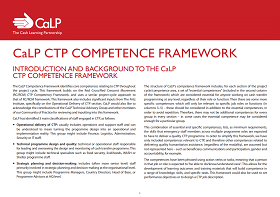
The CALP Network CTP Competence Framework
Guidelines and Tools
The CALP Network Competence Framework identifies core competences relating to CTP throughout the project cycle. This framework builds on the Red Cross/Red Crescent Movement (RC/RCM) CTP Competency Framework, and uses a similar project-cycle approach to that of RC/RCM framework. This framework also...

Evaluation of the OneCard Pilot in Lebanon
Report
The OneCard pilot is part of the WFP-UNHCR Joint Plan of Action for Cash and Vouchers (2014), which aims to implement cash and vouchers using common e-delivery mechanisms. The objectives of the OneCard pilot were: To test the programmatic, technical, and financial efficiency and feasibility of the...

Cash Transfer Programming for Syrian Refugees: Lessons Learned on Vulnerability, Targeting, and Protection from the Danish Refugee Council’s E-Voucher Intervention in Southern Turkey
Report
DRC Turkey is currently implementing a two-year, DFID-funded project that aims to provide immediate support to and strengthen the coping mechanisms of vulnerable non-camp Syrian refugees in southern Turkey. The first phase of the project focused on identifying and providing monthly cash transfers (in the...
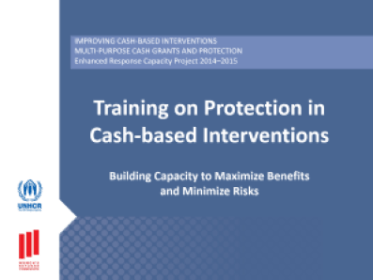
Protection in Cash-based Interventions Training: Building capacity to maximize benefits and minimize risks
Guidelines and Tools
This participatory curriculum is based on the inter-agency Guide for Protection in Cash-based Interventions (CBIs). The one-day training provides practical instruction for analysing and monitoring protection risks and benefits in CBIs. Slides, facilitators’ guide, case studies, and other materials for...

Guidance Notes: Cash Transfers in Livelihoods Programming- West Africa
Guidelines and Tools
A growing acceptance of cash transfers as an inter-sectorial tool is accompanied by a better understanding of this approach and its potential to break the cycle of poverty, after much discussion on the role cash transfers have to play in building resilience. In the Sahel, food security experts have...
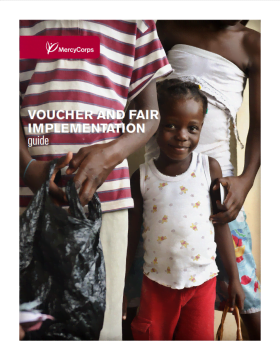
Voucher and Fair Implementation Guide
Guidelines and Tools
Mercy Corps’ Voucher and Fair implementation Guide provides clear, step-by-step guidelines for teams implementing cash, restricted cash, or commodity voucher programmes. Written for an internal audience, the Guide may also be useful for peer agencies.

Guidelines on Cash Transfers and Livelihoods – Latin America
Report
This document, like the learning workshop that took place in Guatemala City on 16th and 17th November 2015, focuses primarily on the context in Central America. Due to the profile of the participants and the complex problems of the region (the Dry Corridor, high exposure to hurricanes, high levels of...

Cash in Emergencies Toolkit
Guidelines and Tools
Access Toolkit Here Cash transfer based programming (CTP) is an effective and flexible way to support people affected by emergencies, maintaining their dignity and choice, while fostering local economies. CTP includes all forms of cash and voucher-based assistance. The Cash in Emergencies Toolkit has been...



